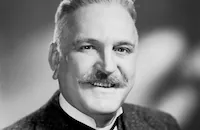Reunion in Vienna
Brief Synopsis
Cast & Crew
Sidney Franklin
John Barrymore
Diana Wynyard
Frank Morgan
Henry Travers
May Robson
Film Details
Technical Specs

Synopsis
Elena Krug, the wife of noted Viennese psychoanalyst Dr. Anton Krug, spends an afternoon surreptiously reliving old memories in the Schoenbrunn Palace, the former residence of the Imperial family, where as a young woman she was romanced by the notorious playboy, Archduke Rudolf Maximilian von Hapsburg. When she returns home, Elena learns that the exiled Rudolf is crossing the Austrian border to participate in a celebration of the one-hundreth anniversary of the Emperor's birth. Although she maintains to Anton, who has just broadcast a speech decrying the Hapsburg legacy, that she no longer is interested in the "old days," Anton insists that she attend the hotel party and "let herself go" as a way of purging herself of her past. As the party begins, a disguised Rudolf, who has been working as a taxi driver in Paris, sneaks into the Lucher Hotel and questions its owner, Frau Lucher, about Elena. Frau Lucher tries to discourage the persistent Rudolf from seeing Elena, but Elena arrives too soon to be warned. In the face of Rudolf's rough advances, Elena calmly tells her former flame that she truly loves her husband. Undaunted, Rudolf pockets Elena's wedding ring and tries a variety of methods to get her into his bed for the night. After Elena gayly slips away from his bedroom, Rudolf follows her home, not intimidated by the local policemen who are searching the hotel for him. Although Anton is at first unflappable and civil, the archduke's self-centered and brazen behavior toward Elena forces him to challenge Rudolf to a fistfight. Before the first blow is struck, however, Anton collects his reason and expresses his dismay that Rudolf has succeeded in provoking him into a jealous rage. At that moment, Rudolf learns that the police are in the building and, at Elena's urging, agrees to hide while Anton talks with them. Soon after, Anton returns and informs Elena that, in order to save Rudolf, he must leave to see the prefect of police that night. Once aware of Anton's sacrifice, Rudolf, whose sense of honor prevents him from seducing the wife of a benefactor, bemoans his rival's cleverness. Elena consols Rudolf, who finally admits that, while she is thriving as a trustworthy wife, his days as a privileged rogue are finished. The next morning, Rudolf entertains Elena and her garrulous father-in-law over breakfast, then after Anton, who has arranged for the archduke's safe passage to the border, returns, slips Elena's wedding ring into Anton's hand and graciously says farewell.

Director

Sidney Franklin
Cast

John Barrymore

Diana Wynyard

Frank Morgan

Henry Travers

May Robson

Eduardo Ciannelli

Una Merkel
Bodil Rosing
Bela Loblov
Morris Nussbaus

Nella Walker
Herbert Evans
Ferdinand Gottschalk
Torben Meyer
George Davis
Paul Porcasi
Rolfe Sedan
Crew
Adrian
Dr. William Axt
Hugh Boswell
George Folsey
Sidney Franklin
Cedric Gibbons
Paul Neal
Blanche Sewell
Douglas Shearer
Ernest Vajda
Claudine West
Edwin Willis

Film Details
Technical Specs

Award Nominations
Best Cinematography
Quotes
Trivia
Notes
According to the Variety review, M-G-M, "in deference to the Hays code and the fear of censorship," changed Robert E. Sherwood's play by not having "Rudolf" and "Elena" sleep together. Variety continues: "This was the very foundation of the Sherwood play; the psychiatrist who realizes that his future happiness will best be conserved by permitting his wife to rid herself of a fixation for her once royal lover, now reduced to taxi driving....Revision robs the play of its sole claim to novelty of appeal and reduces itself to the level of the 'Zenda' stories. It's like diluting vintage wines to 3.2 and still maintaining it's wine."
Although Film Daily announced that Otto Kruger was to make his screen debut in this production and included him in the cast list in its review, the actor did not appear in the final film. English-born stage actor actor Henry Travers (1874-1965), best known for his role as the angel "Clarence Oddbody" in Frank Capra's 1946 Christmas classic It's a Wonderful Life, made his motion picture debut in Reunion in Vienna. For his work on the picture, cinematographer George J. Folsey received an Academy Award nomination. According to modern sources, Lionel Barrymore was announced in the part of Anton Krug but, because of other contractual obligations, was replaced by Frank Morgan. Modern sources note that the film was a box office failure.













